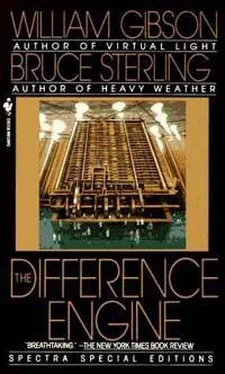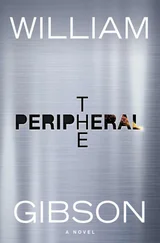William Gibson - The Difference Engine
Здесь есть возможность читать онлайн «William Gibson - The Difference Engine» весь текст электронной книги совершенно бесплатно (целиком полную версию без сокращений). В некоторых случаях можно слушать аудио, скачать через торрент в формате fb2 и присутствует краткое содержание. Жанр: sf_cyber_punk, fantasy_alt_hist, на английском языке. Описание произведения, (предисловие) а так же отзывы посетителей доступны на портале библиотеки ЛибКат.
- Название:The Difference Engine
- Автор:
- Жанр:
- Год:неизвестен
- ISBN:нет данных
- Рейтинг книги:3 / 5. Голосов: 1
-
Избранное:Добавить в избранное
- Отзывы:
-
Ваша оценка:
- 60
- 1
- 2
- 3
- 4
- 5
The Difference Engine: краткое содержание, описание и аннотация
Предлагаем к чтению аннотацию, описание, краткое содержание или предисловие (зависит от того, что написал сам автор книги «The Difference Engine»). Если вы не нашли необходимую информацию о книге — напишите в комментариях, мы постараемся отыскать её.
The Difference Engine — читать онлайн бесплатно полную книгу (весь текст) целиком
Ниже представлен текст книги, разбитый по страницам. Система сохранения места последней прочитанной страницы, позволяет с удобством читать онлайн бесплатно книгу «The Difference Engine», без необходимости каждый раз заново искать на чём Вы остановились. Поставьте закладку, и сможете в любой момент перейти на страницу, на которой закончили чтение.
Интервал:
Закладка:
"Yes, actually, I have."
"What kind of place is that?"
Mori was examining, with keen interest, the rectangular dish of coarse grey cardboard beneath his potato.
"It's very pleasant," Oliphant said, "very picturesque. The Hydropathic Pavilion is quite famous—"
"Is it in England?" Helen America asked, around a mouthful of toad-in-the-hole.
"It is, yes."
"Lot of working-folks?"
"Perhaps not, in the sense I take you to mean, though the various facilities and attractions employ a great many people."
"Haven't seen a real factory-crowd since we got here. Well—let's eat!" And with that, Helen America bent to the task. Dinner-conversation, Oliphant gathered, was not highly valued in Red Manhattan.
She left the cardboard "dishes" utterly devoid of scraps or crumbs, contriving to sop up the last dross of gravy with a chip she had carefully retained for this purpose.
Oliphant took out his notebook. Opening it, he removed a plain white card stippled with Florence Bartlett's Bow Street portrait. "Are you familiar at all with Flora Barnett, the American actress. Miss America? She's enormously popular in Manhattan, or so I was recently told… " Oliphant displayed the card.
"She's no actress, mister. Nor an American either. She's a Southron, if you can even call her that; next thing to a damn' Frenchie. The People Risen don't need her kind. Hell, we've already hung our share of 'em!"
"Her kind?"
Helen America met his gaze with a defiant stare. "In a pig's eye, you're a journalist… "
"I'm sorry if—"
"Sorry like the rest of 'em. You give just about that much of a damn… "
"Miss America, please, I wish only to—"
"Thanks for the feed, mister, but you can't pump me, understand? And that brontosaur, that's got no damn' business over here in the first place! You got no right to it, and one day it'll sit in the Manhattan Metropolitan, for it belongs to the People Risen! And what makes you limeys think you can come digging up the People's natural treasures?"
And in through the door, as if on cue, marched the very formidable Clown of the Manhattan Women's Red Pantomime Troupe, her bald pate hugely bonneted in polka-dot gingham, and her Chickamauga boots even larger than Helen America's.
"Coming right this minute, Comrade Clystra," Helen America said.
The Clown fixed Oliphant with a murderous glare, and then the two were gone.
Oliphant looked at Mori. "A peculiar evening, Mr. Mori."
Mori, apparently lost in contemplation of the Autocafe's clatter and bustle, took a moment to respond.
"We will have places such as this in my country, Oriphant-san! Clean! Modern! Rapid!"
Bligh, upon Oliphant's return to Half-Moon Street, followed him upstairs to the door of the study. "May I come in for a moment, sir?" Locking the door behind them with his own key, Bligh crossed to a miniature parquet bureau that supported Oliphant's smoking-things; unsealing the top of a humidor, he reached inside and removed a squat little cylinder of black-japanned tin. "This was brought 'round to the kitchen door by a young man, sir. He wouldn't give his name, when asked. I took the liberty of opening it myself, sir, recalling some of the more heathen attempts, abroad… "
Oliphant took the canister and unscrewed its lid. Perforated telegraph-tape.
"And the young man?"
"A junior Engine-clerk, sir, to judge by the state of his shoes. Aside from the fact that he wore a clerk's cotton gloves, which he didn't remove."
"And there was no message?"
"There was, sir. 'Tell him,' he said, 'that we can do no more, there is great danger, he mustn't ask again.' "
"I see. Would you mind bringing up a pot of strong green-tea?"
Alone, Oliphant set about removing the heavy glass from his personal receiving-telegraph, a matter of loosening four brass wing-screws. Placing the tall vitrine-like dome out of harm's way, he spent some minutes consulting the maker's instructional manual. After rummaging through several drawers, he located the requisite implements: a walnut-handled brass hand-crank and a small gilt screw-driver embossed with the monogram of the Colt & Maxwell Company. He located the knife-switch at the base of the instrument and severed the electrical connection with the Post Office. He then used the screwdriver to make the necessary adjustments, carefully threaded the end of the tape onto the bright steel sprockets, locked the guide-plates into position, and took a deep breath.
He was all at once aware of the beating of his own heart, and of the night's silence pressing in from the darkness of Green Park, and of the Eye. He took up the crank, thrust its hexagonal tip into the mechanism's socket, and began, steadily but slowly, to turn it clockwise. The character-hammers began to rise and fall, rise and fall, deciphering the punch-code of the Post Office tape. He refused to look at it, as it emerged from the slot.
It was done. With scissors and paste-pot, he assembled the message on a sheet of foolscap:
DEAR CHARLES COMMA NINE YEARS AGO YOU PUT ME TO THE WORST DISHONOR THAT A WOMAN CAN KNOW STOP CHARLES COMMA YOU PROMISED ME THAT YOU WOULD SAVE MY POOR FATHER STOP INSTEAD YOU CORRUPTED ME COMMA BODY AND SOUL STOP TODAY I AM LEAVING LONDON COMMA IN THE COMPANY OF POWERFUL FRIENDS STOP THEY KNOW VERY WELL WHAT A TRAITOR YOU WERE TO WALTER GERARD COMMA AND TO ME STOP DO NOT ATTEMPT TO FIND ME COMMA CHARLES STOP IT WOULD BE USELESS STOP I DO HOPE THAT YOU AND MRS EGREMONT WILL SLEEP SOUNDLY TONIGHT STOP SYBIL GERARD ENDIT
Only barely aware of Bligh arriving with the tea, he sat unmoving for the better part of an hour, the message before him. Then, after pouring himself a cup of luke-warm tea, he gathered stationery, took out his reservoir-pen, and began to compose, in his flawless diplomat's French, a letter to a certain Monsieur Arslau, of Paris.
Flash-powder still stank in the air.
The Prince Consort turned, with his full Teutonic gravity, from an elaborate stereoptic camera, of Swiss manufacture, and greeted Oliphant in German. He wore aquamarine spectacles, their circular lenses no larger than florins, and was draped in a photographer's smock of spotless white duck. His fingers were stained with silver nitrate.
Oliphant bowed, wishing His Highness a good afternoon in what amounted to the Royal Family's language of choice, and pretended to examine the Swiss camera, an intricate creation whose stereoptic lenses, like eyes, stared from beneath a smooth brass brow. Like the eyes of Mr. Cart, the Consort's muscular Swiss valet, they struck Oliphant as being set rather too widely apart.
"I've brought Affie a little gift, Your Highness," Oliphant said. His German, like the Prince Consort's, had the accent of Saxony—the legacy of a prolonged and delicate mission Oliphant had undertaken there at the behest of the Royal Family. Prince Albert's Coburg relatives, ever ingenious at the ancient craft of marriage-politics, were eager to expand their tiny domain—a delicate matter indeed, when the policy of the British Foreign Office was to keep the German mini-states as fragmented as politically possible. "Has the young Prince concluded his day's lessons?"
"Affie is ill today," Albert said, peering through his tinted spectacles at one of the camera's lenses. He produced a small brush and lightly whisked at the surface of the lens. He straightened. "Do you think the study of statistics too much a burden for a tender young mind?"
"My opinion, Your Highness?" Oliphant said. "Statistical analysis is indeed a powerful technique… "
"His mother and I disagree on the matter," the Prince confided mournfully. "And Alfred's progress in the subject is far from satisfactory. Nevertheless, statistics is the key to the future. Statistics are everything in England."
"Does he progress well in his other studies?" Oliphant hedged.
Читать дальшеИнтервал:
Закладка:
Похожие книги на «The Difference Engine»
Представляем Вашему вниманию похожие книги на «The Difference Engine» списком для выбора. Мы отобрали схожую по названию и смыслу литературу в надежде предоставить читателям больше вариантов отыскать новые, интересные, ещё непрочитанные произведения.
Обсуждение, отзывы о книге «The Difference Engine» и просто собственные мнения читателей. Оставьте ваши комментарии, напишите, что Вы думаете о произведении, его смысле или главных героях. Укажите что конкретно понравилось, а что нет, и почему Вы так считаете.









